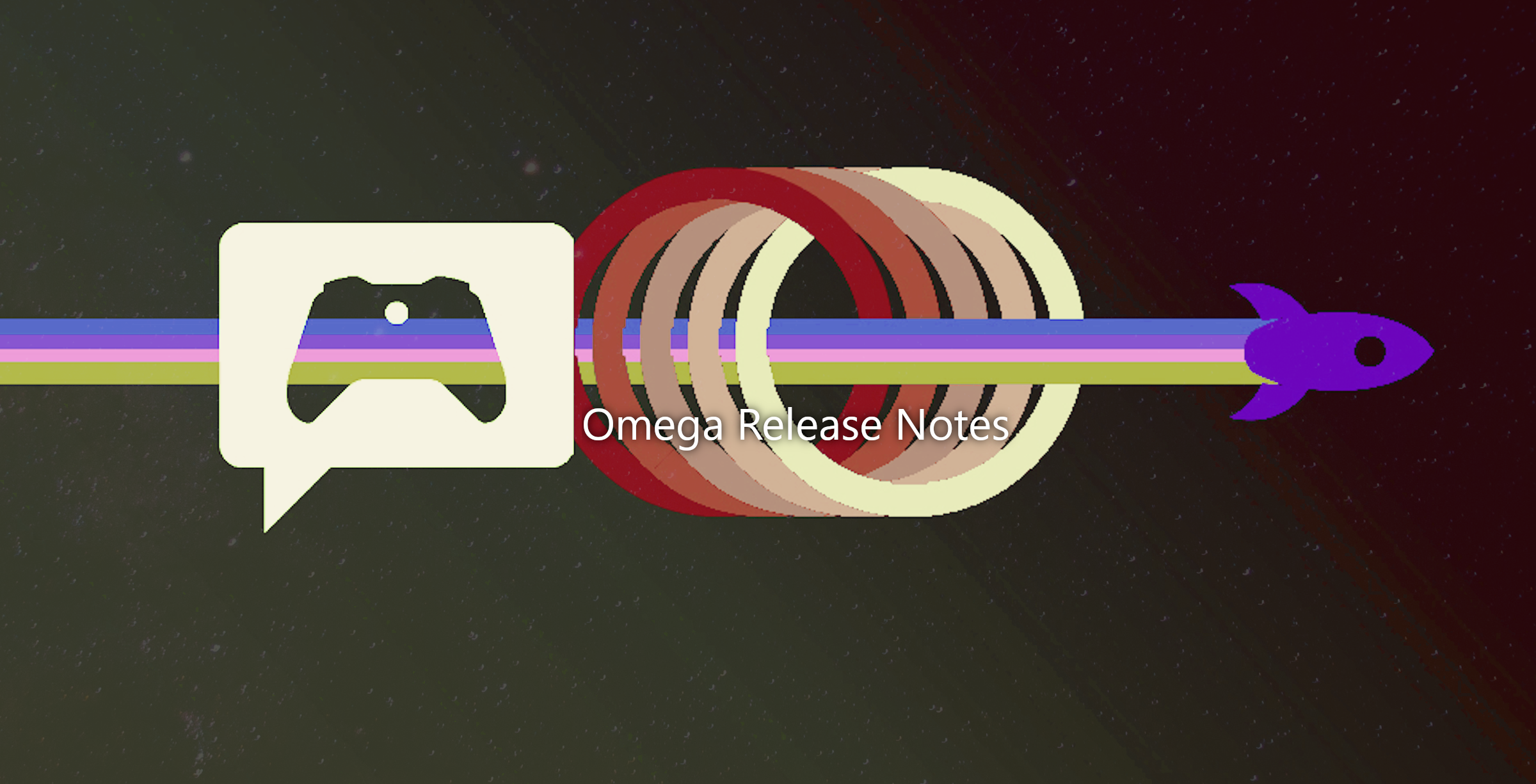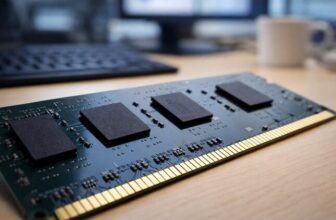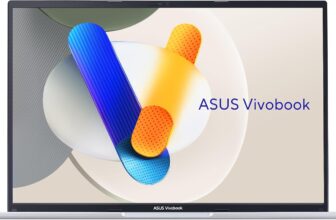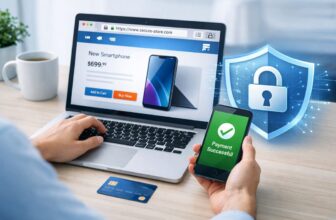
Apple’s Vision Pro mixed-reality headset goes on sale on Friday, February 2, and the first wave of reviews has just landed. It’s probably fair to say that the consensus tilts towards the positive, but having spent longer with the hardware than was possible for the initial preview, early reviewers have all found reservations worthy of note.
Let’s plunge in and check out the verdict.
Design and weight
Following the preview event, where testers were allowed roughly an hour with Vision Pro, there were concerns that longer sessions could prove less pleasant. And that’s borne out by today’s reviews, which express mixed feelings about the device’s comfort.
Writing for CNBC, Todd Haselton strikes a happy note. “The build quality is superb,” he reports. “Apple used top-of-the-line glass, screens, and metals. It feels like a premium headset and it’s comfortable to wear.”
But Nilay Patel, representing The Verge, is less convinced. “The most noticeable thing about the hardware after a while is that it’s just… heavy,” he writes. “I keep joking that the Vision Pro is an iPad for your face, but it’s heavier than an 11-inch iPad Pro and pushing close to a 12.9-inch iPad Pro… You’re just going to feel it after a while.”
It’s not just the weight that’s a worry, either, as Patel adds that Vision Pro became “definitely warm” after long sessions.
Somewhere in the middle sits Scott Stein, reviewing Vision Pro for CNET. “It’s comfy at first,” he begins, “but after half an hour the headset feels top-heavy and pushes in on my cheeks a bit.”
Displays
Vision Pro’s user experience is dependent on lush displays, and all the reviewers were impressed. “The very first thing I noticed in my first demo was how good the displays were,” writes Stein. “The 4K-resolution-per-eye, micro-OLED display tech Apple uses is basically the ‘retina’ moment for VR and AR.”
“Apple is very proud of the displays inside the Vision Pro, and for good reason–they represent a huge leap forward in display technology,” adds Patel. “They also look generally incredible–sharp enough to read text on without even thinking about it, bright enough to do justice to movies.”

The reviewers all agreed that the Vision Pro’s displays are incredible.
Petter Ahrnstedt / Foundry
Audio
So much for vision; what about sound? Again, Vision Pro’s speaker setup came in for consistent praise.
“The built-in speakers are great,” reports Haselton. “They get nice and loud and support spatial audio, so if you turn your head away from the movie in front of you, the sound stays in the same place, much like if you were watching a real TV. Music and movies sounded fantastic, with full surround sound.”
Patel, meanwhile, described the speakers as “good and loud” and said they do “a convincing job of rendering spatial audio.”
However, all the reviewers warned that Vision Pro’s speakers are a little prone to leakage. “The speaker buds are open, angling down to aim at your ears similar to Meta’s Quest headsets, and can be heard by others in the room,” notes Stein. “A more enclosed feel comes if you slip in AirPods, which auto-connect seamlessly.”
Interface
Writing for the Wall Street Journal, Joanna Stern found Vision Pro’s controls and interface relatively easy to use… most of the time. “Getting around is intuitive,” she writes, “even if other people in the room think you’re playing a demented game of charades. At times, the Vision Pro’s eye tracking didn’t respond to my movements. Adjusting the fit of the headset got things back on track.”
CNET’s Stein, however, suspected that the inclusion of an instruction manual hinted at problems in this department. “It’s a sign that setting up and navigating this spatial computer is a whole new universe, and not always intuitive,” he explains. And sure enough, he finds that controls “take getting used to. Any icon or button I look at is highlighted, grows in size or glows, and tapping my fingers selects it. It’s jarring at first.” In the end, however, he concludes that it is intuitive.
Nilay Patel, too, has reservations. “The first few times you use hand and eye tracking on the Vision Pro, it’s awe-inspiring,” he says. “It feels like a superpower. But the next few times, it stops feeling like a superpower–and in some cases, it actively makes using the Vision Pro harder. It turns out that having to look at what you want to control is really quite distracting.”
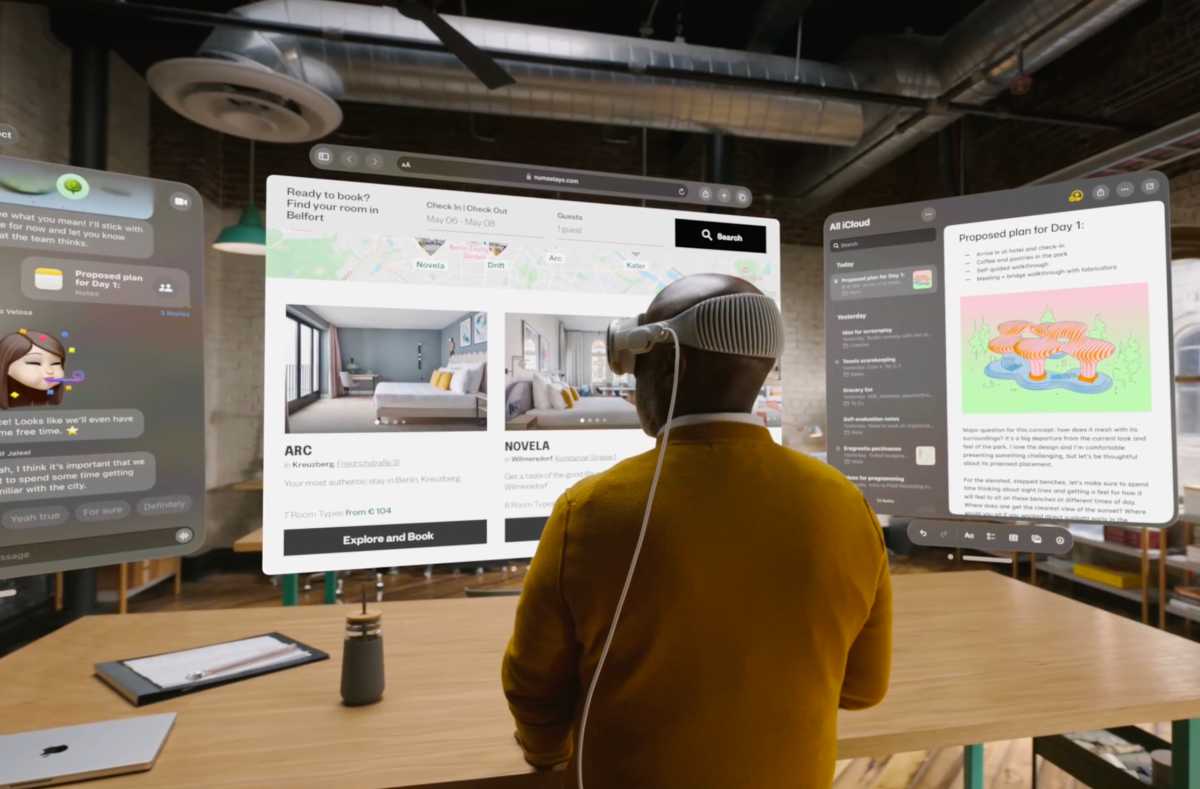
Vision Pro can extend your Mac’s display.
Apple
Mac Virtual Display
The device’s ability to sync seamlessly with a Mac has been touted as a transformative productivity feature. But what is it actually like to work using Vision Pro? Pretty good, according to Patel. “Mac display sharing works really well, and Apple ecosystem tricks like Handoff and Continuity are pure magic in this context,” he writes.
But there are worries about typing using Vision Pro’s software keyboard. “The floating keyboard is useful for search or typing quick messages, but you won’t be able to type very fast at first,” says Stein. And Stern is more critical still: “There is a built-in virtual keyboard so you can type in thin air. But it will drive you mad for anything longer than a short message… I started getting real work done once I paired the Vision Pro with a Bluetooth keyboard and mouse.”
Personas
A major part of Vision Pro’s sales pitch is its ability to connect you with colleagues and loved ones. But as a bulky and enclosing headset, it also has the potential to create isolation. Does it work from a social point of view?
Not perfectly. For a start, the Persona avatars created for use in FaceTime calls and elsewhere were found to drift into the Uncanny Valley. “On FaceTimes with friends and family, the reviews were unanimous, reports the WSJ’s Stern. “‘You look awful,’ my sister said.”
“[My Persona] looked like a much older version of me,” adds Haselton. “My colleague thought I looked like an 80-year-old man. My wife laughed.”
Stein, meanwhile, worries that the device is too isolating. “My wife says she doesn’t like this, that I’m so removed from everything,” he explains. “My son calls it a phone for my face. They have a point.”
The EyeSight feature, which puts realistic images of your eyes on the front-facing displays to encourage a sense of connection with people nearby, was not a hit.
“EyeSight might as well not be there,” is Patel’s verdict. “It’s a low-res OLED with a lenticular panel in front of it to provide a mild 3D effect, and it’s so dim and the cover glass is so reflective, it’s actually hard to see in most normal to bright lighting. When people do see your eyes, it’s a low-res, ghostly image of them that feels like CGI.”
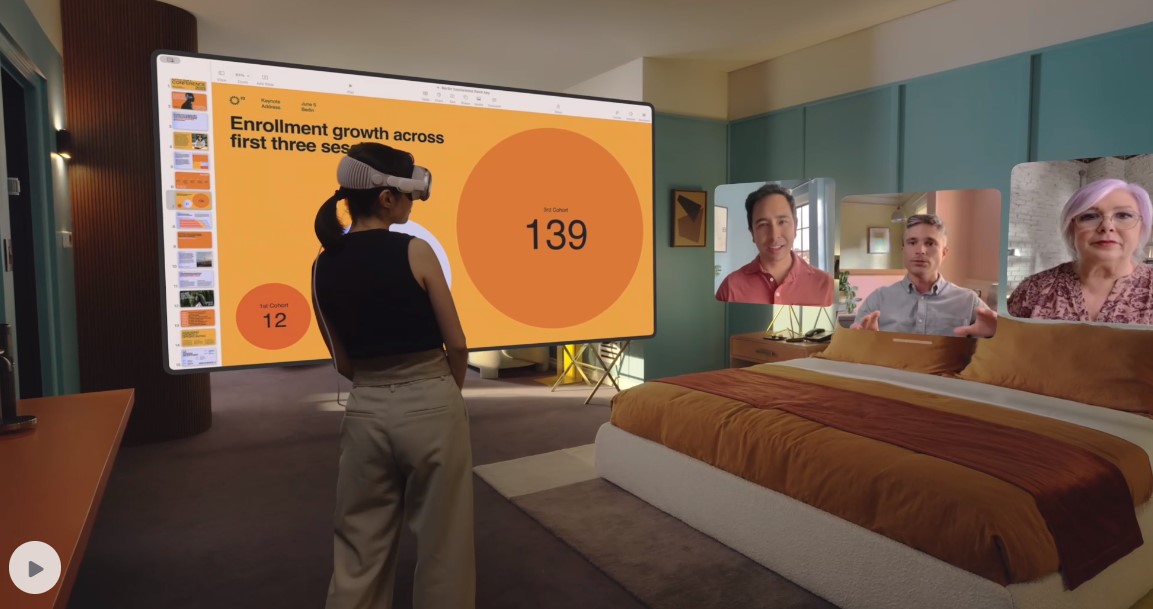
Personas are still in beta with Vision Pro—and the reviewers noted that they need work.
Apple
Movies and entertainment
Another selling point is entertainment. Would our reviewers turn down a trip to the cinema in favor of a night in front of Vision Pro?
Stein is convinced. “Right now, the closest thing to a killer app the Vision Pro has is its cinema-level video playback,” he writes. “If you go for a demo and see it, you’ll probably be just as stunned as I’ve been.”
Haselton enjoyed the entertainment offering too. “I loved watching movies with the headset,” he writes. “I [also] used the NBA app, which was updated to work on the Vision Pro, to stream four games at once, with the main game in the middle and others pinned to the sides. It’s wild.”
Finally, The Verge’s Patel admitted that he “watched far more of Top Gun: Maverick than I intended to just because it looked so good blown up to drive-in movie size, floating over a mountain.”
Augmented Reality
Most of the applications discussed so far refer to virtual reality, where fictional images are displayed in a completely enclosed fictional world. But Vision Pro offers mixed reality, which also includes augmented reality, where digital images are superimposed on photographic images of the world around you. Is this effective?
Stern thinks so. “The Vision Pro is the ultimate culinary computer,” she enthuses. “I launched the Crouton app, and placed the Balsamic Mushroom and Sausage Pasta recipe to one side of the kitchen. The ‘wow’ moment came at the stove when I dragged one timer over the boiling pasta and another over the browning mushrooms. They just hovered until time was up.”
Stein, meanwhile, was impressed with the technical performance in augmented reality. “Apple’s passthrough cameras are the best I’ve seen, with almost no distortion,” he reports.
But Patel has a more existential concern about augmented reality: there simply isn’t enough of it. “One of the weirder things about visionOS (and the Vision Pro itself, really) is that there’s not a lot of true AR in the mix–as in, actual interaction between physical objects in your space and digital ones,” he explains. “After all these years of Apple talking about AR, I counted exactly three things in my entire time with the Vision Pro that offered a preview of the AR future.”
Battery
A common response to the initial demos was a worry that Vision Pro simply doesn’t last long enough between charges. Our reviewers acknowledged this.
Stein regretfully notes “the limited battery life. The Vision Pro lasts about two hours or so on a charge despite its big battery. You could keep it USB-plugged into a nearby outlet via the battery, but that’s a lot of cabling. By comparison, my MacBook Air lasts well over a day.”
The battery pack didn’t bother Stern much, “even if I looked like a high-tech marionette. But I did have to charge every two to three hours, so most of the time, I plugged myself into the wall with the 5-foot cord.”
Patel found the whole thing amusing. “It’s very Apple that the battery is not actually bigger so it can provide more than two and a half hours of run time,” he chuckles.
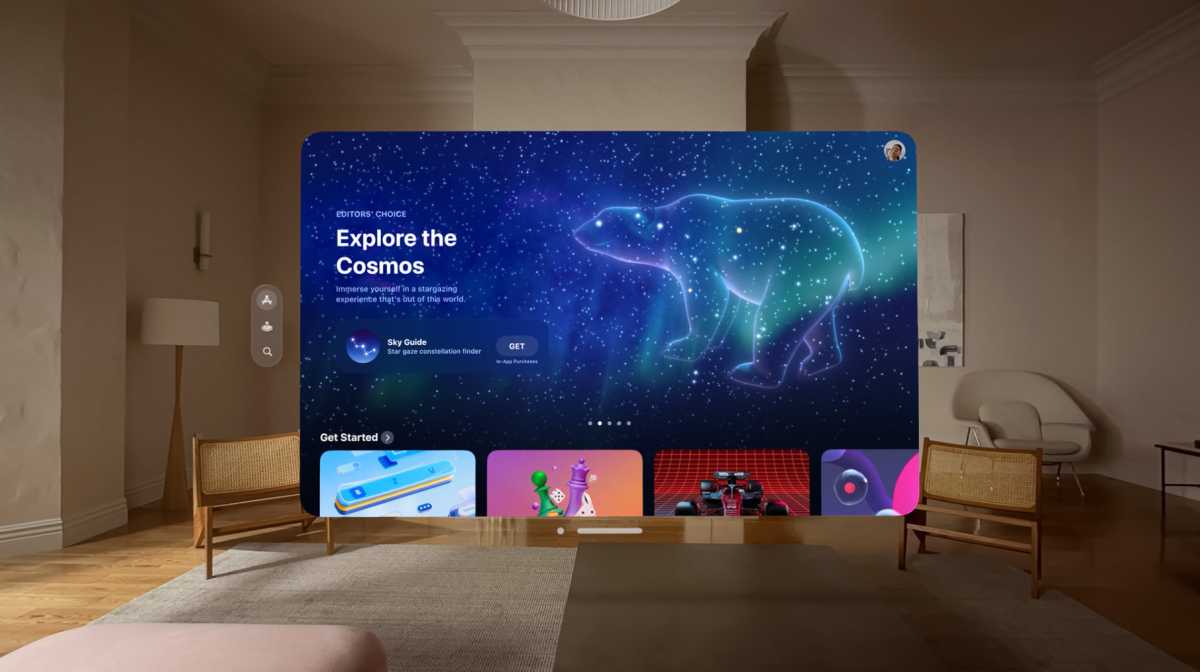
Vision Pro’s app library is missing more than just Netflix
and Spotify.
Apple
Apps
Are there enough apps? Our reviewers felt not.
“The biggest unanswered question about Vision Pro is how many unique apps will emerge for it,” writes CNET’s Stein. “At the time of this review, prelaunch, the App Store shows Vision Pro-optimized apps, but pickings are slim.”
Haselton, meanwhile, notes the widely documented absence of Netflix and Spotify, but adds that “there are lots of others that I couldn’t find: 1Password isn’t there… You won’t find Uber, DoorDash (but there’s GrubHub!) or Amazon. None of Google’s apps are here… Popular games like Diablo Immortal and Genshin Impact aren’t available. Facebook’s apps aren’t here, so no Instagram.”
And Nilay Patel argues that while it’s hard to judge the app ecosystem for a brand-new product, “I feel totally comfortable judging the iPad app ecosystem at this point, and Apple shipping its own podcast and news apps as iPad apps on the Vision Pro feels like a sign in a lot of ways.”
Price
The $3,499 question: is Vision Pro worth the money? Probably not at this point.
The WSJ’s Stern decided to state very early that “You’re probably not going to buy the $3,500 Apple Vision Pro. Unless you’re an app developer or an Apple die-hard, you’re more likely to spend that kind of money on an actual trip to a Hawaiian volcano.”
Scott Stein, meanwhile, describes the product as “unbelievably expensive.”
Verdict
With all that said, did our reviewers feel that Vision Pro is a success? Would they recommend a purchase? In most cases, no, but they remain impressed by the technology.
“The headset is the best wearable display I’ve ever put on,” reports Stein. “But at its price, and with so few VisionOS apps at launch, the Vision Pro isn’t a device I’d recommend to any of my friends or family. [It] comes with its own drawbacks and limits all over the place. But it’s also, at its best, a stunning look at the future.”
Joanna Stern writes that the headset “has all the characteristics of a first-generation product: It’s big and heavy, its battery life sucks, there are few great apps and it can be buggy.”
“It sounds amazing, and sometimes it is,” adds Patel. “But the Vision Pro also represents a series of really big tradeoffs–tradeoffs that are impossible to ignore.”
Haselton was perhaps the most positive of the four reviewers, so let’s end on a happy note.
“While it has some shortcomings,” he writes, “it’s easily the most fun new product I’ve tried out in years. I’m convinced that if Apple eventually sells cheaper versions, we’ll see millions of people using them in the coming years. It’s Apple’s most exciting product in years and it’s the best example yet that this will become a new way of computing.”


